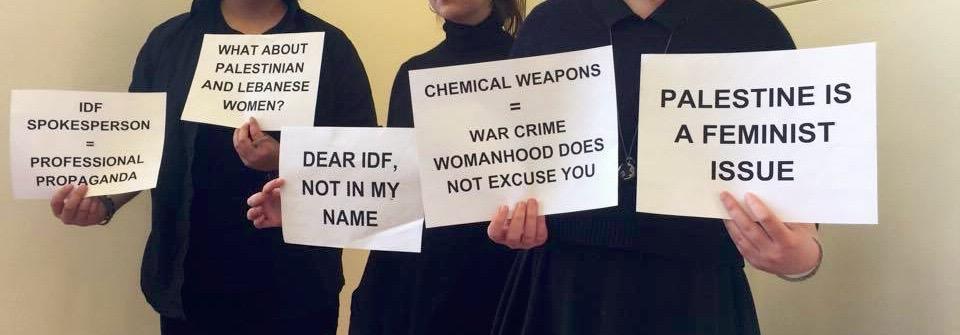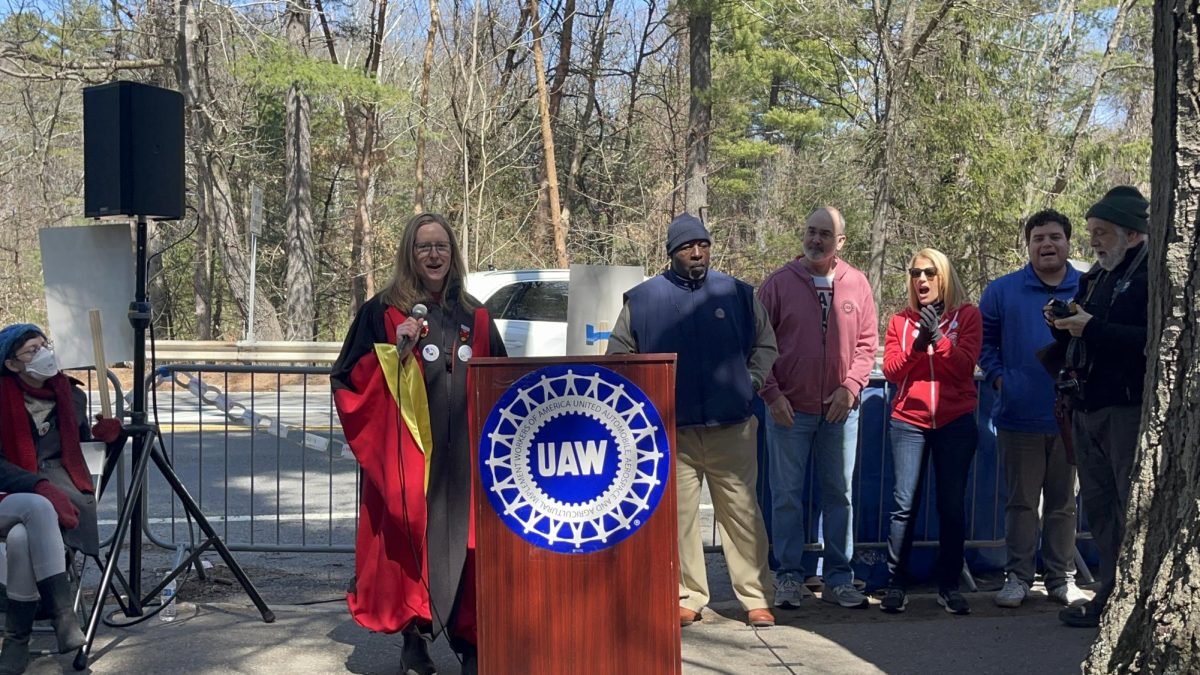On Monday, Feb. 27, the Political Science Majors Council hosted Miri Eisin, a former spokesperson for the Israeli Defense Forces (IDF), to speak about women in intelligence and security professions, what women need to do to advance in these professions and how they can become empowered. Students from Jewish Voices for Peace (JVP), Justice for Palestine (JFP) and the Wellesley Arab Women Association (WAWA) held a silent demonstration during Eisin’s lecture to protest the unethical practices of the IDF during the Lebanese War in 2006 and Eisin’s individualistic definition of feminism.
Tiffany Chung ’17, one of the three elected members of the Political Science Major’s Council, said that the Council decided to invite Eisin to discuss female representation in the IDF and Eisin’s own experience in the IDF.
“We invited Miri Eisin to speak as we thought her experience as a female officer in intelligence and decision to retire added a valuable and relevant perspective to the debate on a woman’s place in the political and military sphere in Israel. As Ms. Eisen noted, the military is often a shortcut into Israeli politics, and the lack of female representation in Israeli military means that Israeli politics faces the same gender inequality. Israeli domestic politics have importance to how it interacts with neighboring Arab countries and close ally U.S. We spoke with Ms. Eisin, who agreed to speak about her experience and what it meant to be a woman in the IDF, ” Chung said.
Eisin was a spokeswoman for the Israeli government during the Lebanese War in 2006 and her job included defending the military actions of Israel during the war. According to The United Nations Children’s Fund, approximately 1,187 civilians, a third of whom were children, were killed during the conflict. Defending Israel, Eisin wrote in a 2009 piece for Haaretz, an Israeli newspaper, “Israel is described as an occupying force, belligerent, expanding, lacking moral values, in contrast to the Palestinian, who has nothing.”
Students pushed back against Eisin due to her connections with the Lebanese War and the path that she took to become successful within the Israeli government. In the view of these demonstrators, Eisin advanced in the IDF at the expense of victims of the Lebanese War, many of whom were women and children, which makes her actions unfeminist.
According to Hannah Lipstein ’17, a member of JVP and one of the demonstrators, it was important to emphasize that Eisin’s actions with the IDF could not be separated from the “apolitical nature” of her lecture.
“I think that advancing in the IDF at expense of Palestinians and Lebanese people who have suffered immensely over the course of her 20-year career is inherently unfeminist. She uses her individualistic view of feminism to disguise the deeply violent consequences of her career and obscures the oppressive reality of the military that she works and advocates for, ” Lipstein said.
Dina Al-Zu’bi ’19 elaborated on the reasoning for the demonstration, saying that it was important for the students attending the lecture to be aware of Eisin’s work and the work of the IDF, and to amplify the voices of those that were affected. “It was also about making sure our voices were being heard and that we were present. We wanted to emphasize, mainly to the fellow Wellesley students that were there, what it means that this person is speaking and under what guise,” Al-Zu’bi emphasized.
Chung and the Political Science Majors Council welcomed the demonstrators at the lecture and encouraged them to push back against the speaker.
“We welcome all peaceful demonstrations and protests. The PSMC is firmly opposed to the silencing of any voices. Before the talk, we reached out to the organizers of the event through email to emphasize that they were welcome at the event, to promise there would be no hostility and to encourage them to ask difficult questions and engage with the speaker,” Chung said.
Throughout the lecture, demonstrators held posters with phrases such as “Not in my name,” a phrase used by Jewish-Americans who condemn the political and military actions of Israel.
“There is often a really dangerous conflation of Judaism with support for all the actions of Israel and Israel’s state politics. Israel does not speak for all Jews, and this is a violence we do not condone happening in our names,” Lipstein said.
Other posters included phrases such as “How many Palestinian Women had to die for you to be heard?” and “Women and oppression are not mutually exclusive.”
Lipstein and Al-Zu’bi hope that their organizations can spark conversations on campus about Palestinian justice. In the coming weeks, they will be doing a myth and fact poster campaign about Israel and Palestine.






